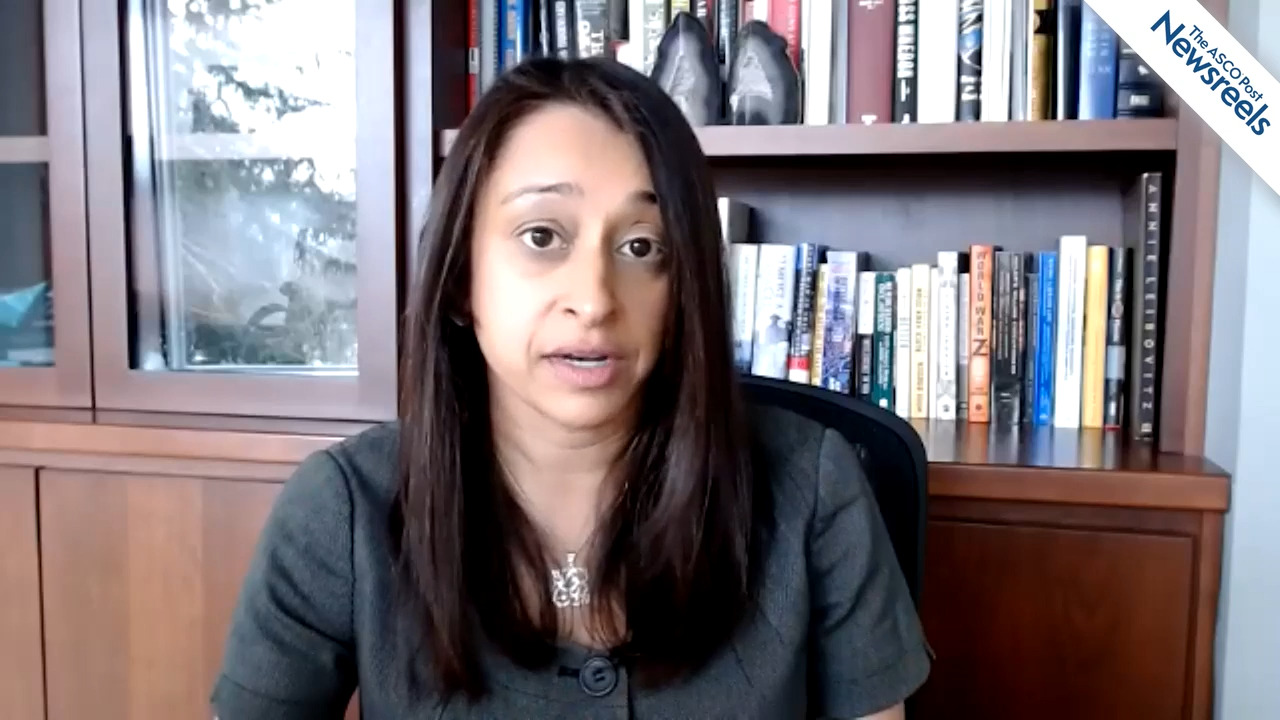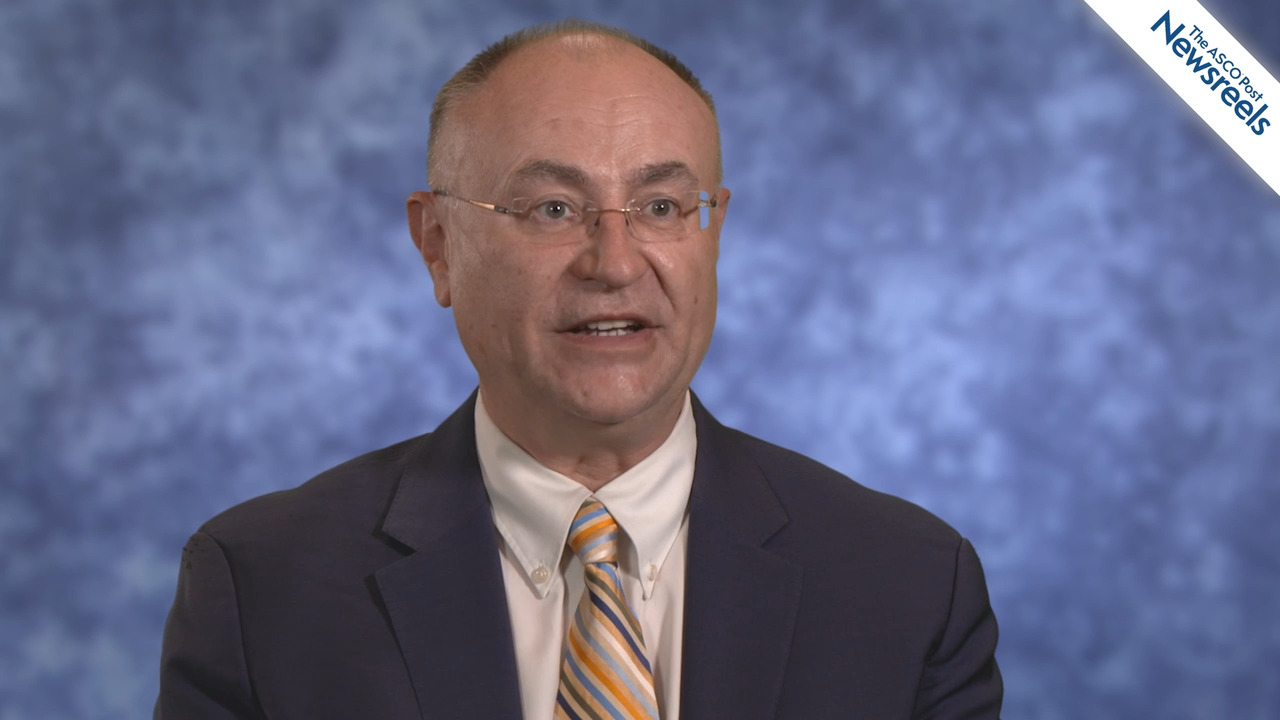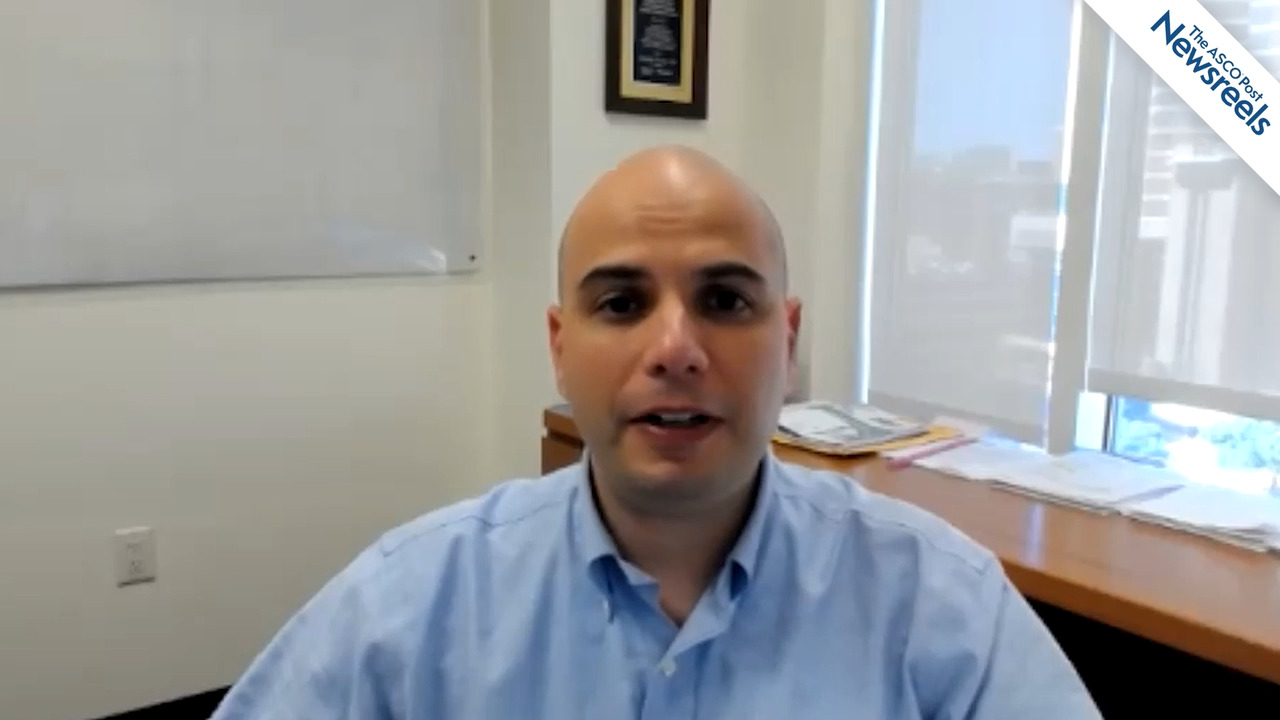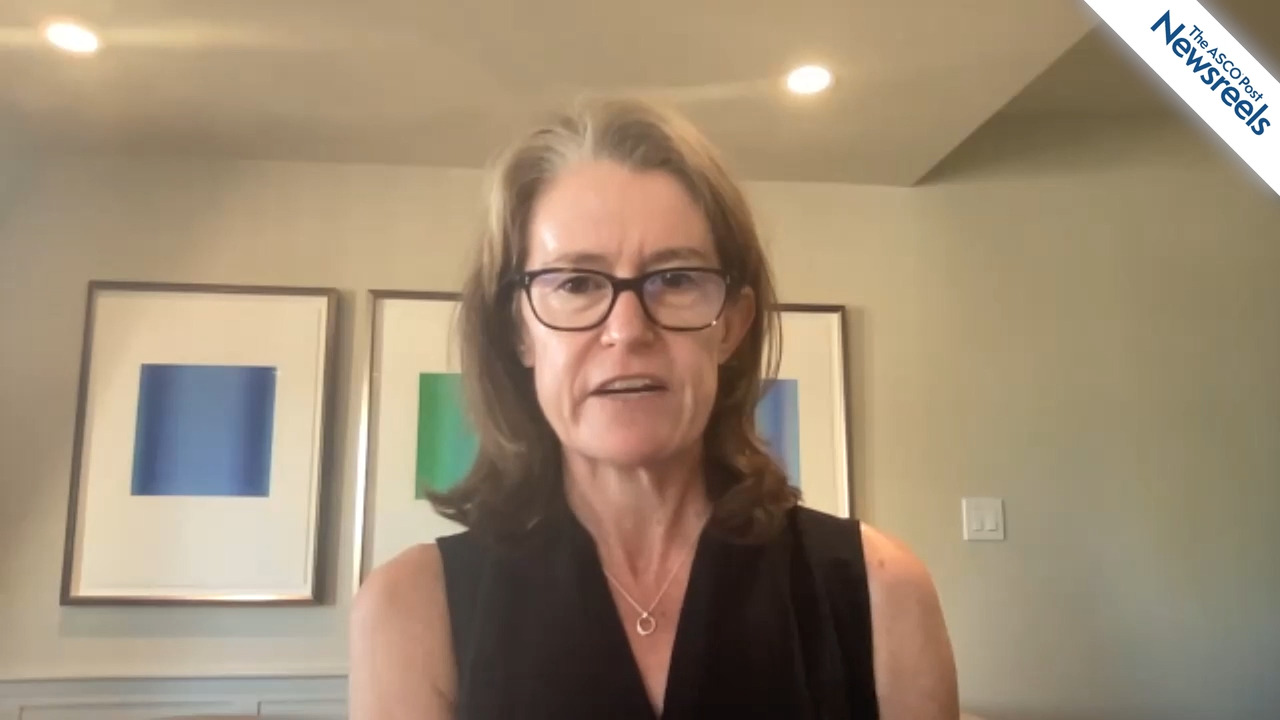Nilofer Saba Azad, MD, on Novel Treatment Combinations Under Study in Biliary Tract Cancers
Nilofer Saba Azad, MD, of Johns Hopkins Sidney Kimmel Cancer Center, assesses the findings from the phase III TOPAZ-1 trial, a study of durvalumab in combination with gemcitabine plus cisplatin in patients with advanced biliary tract cancer. Dr. Azad explains why the study sets a potential new standard of care of gemcitabine plus cisplatin and durvalumab in unselected patients.
Pembrolizumab for Adjuvant Treatment of Stage IIB or IIC Melanoma
On December 3, 2021, pembrolizumab was approved for adjuvant treatment of adult and pediatric (≥ 12 years of age) patients with stage IIB or IIC melanoma following complete resection.1 Supporting Efficacy Data Approval was based on findings in the phase III, double-blind KEYNOTE-716 trial...
Daratumumab/Hyaluronidase-fihj and Carfilzomib in Multiple Myeloma
On November 30, 2021, daratumumab/hyaluronidase-fihj and carfilzomib were approved for use in combination with dexamethasone for adults with relapsed or refractory multiple myeloma who had one to three prior lines of therapy.1,2 Supporting Efficacy Data Approval was based on findings in a cohort...
Rituximab Plus Chemotherapy for Pediatric Mature B-Cell Non-Hodgkin Lymphoma and Mature B-Cell Acute Leukemia
On December 2, 2021, rituximab was approved for use in combination with chemotherapy for pediatric patients (≥ 6 months to 18 years) with previously untreated, advanced-stage, CD20-positive diffuse large B-cell lymphoma, Burkitt lymphoma, Burkitt-like lymphoma, or mature B-cell acute leukemia.1...
Adjuvant Atezolizumab in IMpower010: Moving the Needle in Early-Stage NSCLC
Adjuvant platinum-based chemotherapy for early-stage non–small cell lung cancer (NSCLC) is currently almost an afterthought and is taken for granted as a standard of care for patients with stage II to IIIA NSCLC after resection. The earliest meta-analysis, published in 1995,1 gave the first hint of ...
Adjuvant Atezolizumab Improves Disease-Free Survival Following Adjuvant Chemotherapy in PD-L1–Positive Resected Stage II–IIIA NSCLC
As reported in The Lancet by Enriqueta Felip, MD, of Vall d’Hebron University Hospital, Barcelona, and colleagues, the phase III IMpower010 trial has shown improved disease-free survival with adjuvant atezolizumab vs best supportive care in the predefined population of patients with resected stage ...
Promise and Need for More Progress in Treatment of Squamous Cell NSCLC
A greater understanding of the mutational landscape in non–small cell lung cancer (NSCLC) has identified key oncogenes, such as EGFR, ALK, ROS, RET, and BRAF, among others. These discoveries, coupled with the availability of specific targeted small-molecule inhibitors, have transformed the...
Pembrolizumab Plus Chemotherapy in Advanced Esophageal Cancer: Good News for Some, but More Work to Be Done
Multiple comparisons of traditional cytotoxic chemotherapy combinations that began decades ago led to the adoption of the platinum plus fluorouracil doublet as the standard of care for treatment of recurrent or metastatic esophageal cancer.1 Other combinations created by the addition and/or...
BELINDA Trial: CAR T-Cell Therapy Fails to Improve Outcomes in Aggressive Non-Hodgkin Lymphoma
The autologous chimeric antigen receptor (CAR) T-cell therapy tisagenlecleucel failed to improve event-free survival vs standard-of-care treatment strategies in patients with aggressive, relapsed or refractory non-Hodgkin lymphoma (NHL), according to results of the phase III BELINDA trial,...
Circadian Timing of Immune Checkpoint Inhibitors: Beyond Good Times and Bad Times
After almost a century of limited efficacy of cancer immunotherapy,1 the breakthrough happened in 2012 with the discovery of immune checkpoint inhibitors,2,3 leading to the 2018 Nobel Prize in Physiology or Medicine for James P. Allison and Tasuku Honjo. Yet about 40% of patients on immune...
Metastatic Melanoma: Improved Overall Survival Reported With Immunotherapy Infusions Given Earlier in the Day
In a single-institution study reported in The Lancet Oncology, David C. Qian, MD, PhD, and Zachary S. Buchwald, MD, PhD, of Winship Cancer Institute of Emory University, Atlanta, and colleagues found that patients with metastatic melanoma who received at least 20% of immune checkpoint inhibitor...
Heinz-Josef Lenz, MD, on Colorectal Cancer: Update From the CheckMate 9X8 Trial on Nivolumab, mFOLFOX6, and Bevacizumab
Heinz-Josef Lenz, MD, of USC Norris Comprehensive Cancer Center, discusses phase II results from the CheckMate 9X8 study, which compared nivolumab plus fluorouracil/leucovorin/oxaliplatin (mFOLFOX6) and bevacizumab vs mFOLFOX6 and bevacizumab in the first-line treatment of metastatic colorectal cancer. A subgroup of patients may benefit from adding nivolumab to the standard of care in this setting (Abstract 8).
T-DXd for Previously Treated Patients With Metastatic HER2-Mutant NSCLC
In the phase II DESTINY-Lung01 trial reported in The New England Journal of Medicine, Bob T. Li, MD, PhD, MPH, and colleagues found that fam-trastuzumab deruxtecan-nxki (T-DXd) showed durable activity in patients with metastatic HER2-mutant non–small cell lung cancer (NSCLC) refractory to standard...
Long-Term Outcomes After Neoadjuvant Chemotherapy With or Without Carboplatin and Bevacizumab for Triple-Negative Breast Cancer
In an analysis from the phase II CALGB 40603/Alliance trial reported in the Journal of Clinical Oncology, Shepherd et al found that the addition of carboplatin or bevacizumab to neoadjuvant chemotherapy was not associated with improved long-term outcomes in patients with stage II or III...
Pembrolizumab in Previously Treated Patients With MSI-H/dMMR Endometrial Cancer
As reported in the Journal of Clinical Oncology by David M. O’Malley, MD, and colleagues, pembrolizumab showed durable activity in a cohort of patients with microsatellite instability–high or mismatch repair–deficient (MSI-H/dMMR) advanced endometrial cancer enrolled in the multicohort KEYNOTE-158...
Kohei Shitara, MD, on Gastric and Esophageal Cancers: Long-Term Follow-up on Nivolumab Plus Chemotherapy
Kohei Shitara, MD, of Japan’s National Cancer Center Hospital East, discusses a long-term data follow-up from CheckMate 649, which support the continued use of nivolumab plus chemotherapy as first-line treatment in patients with advanced gastric, gastroesophageal junction, and esophageal adenocarcinomas (Abstract 240).
Combination Therapies May Improve Outcomes Due to Independent, Rather Than Synergistic or Additive, Drug Action
Independent drug action—not synergy nor additivity—accounted for the clinical efficacy of nearly all examined combination therapies involving immune checkpoint inhibitors in clinical trials, according to results from a retrospective analysis published by Palmer et al in Clinical Cancer Research....
Durvalumab/Tremelimumab Improves Overall Survival vs Sorafenib in Patients With Advanced Hepatocellular Carcinoma: HIMALAYA
Results from the randomized international phase III HIMALAYA trial showed that a combination of the anti–PD-L1 immunotherapy durvalumab plus the anti–CTLA-4 immunotherapy tremelimumab reduced the risk of death by 22% in patients with stage III or IV unresectable hepatocellular carcinoma compared to ...
Addition of Nivolumab to Oxaliplatin-Based Chemotherapy for HER2-Negative, Unresectable, Advanced or Recurrent Gastric or Gastroesophageal Junction Cancer
In an Asian phase II/III trial (ATTRACTION-4) reported in The Lancet Oncology, Yoon-Koo Kang, MD, and colleagues found that the addition of nivolumab to oxaliplatin-based chemotherapy improved progression-free survival—but not overall survival—as first-line treatment of HER2-negative, unresectable, ...
Yevgeniy R. Semenov, MD, on Cutaneous Immune-Related Adverse Events and Response to Immune Checkpoint Inhibitors
Yevgeniy R. Semenov, MD, of Massachusetts General Hospital and Harvard Medical School, discusses new findings suggesting cutaneous adverse events such as vitiligo, lichenoid dermatitis, and psoriasis—which often occur in patients with cancer who receive immune checkpoint inhibitors—may be strongly associated with response to therapy and a 22% reduction in mortality (Abstract 814).
Durvalumab Plus Gemcitabine/Cisplatin Improves Survival in Patients With Advanced Biliary Tract Cancer: TOPAZ-1
Biliary tract cancer is a rare and often fatal disease comprised primarily of bile duct and gallbladder cancers; it is diagnosed in about 12,000 individuals each year in the United States. The cancer has a 5-year relative survival rate of 25% for localized intrahepatic bile duct cancers and just...
Durvalumab/Tremelimumab With or Without Radiotherapy in Resistant NSCLC
In a recent phase II clinical trial, the combination of the PD-L1 inhibitor durvalumab and the CTLA-4 inhibitor tremelimumab curtailed tumor growth in some patients with non–small cell lung cancer (NSCLC) that was resistant to a single immunotherapy agent. The addition of radiation therapy to the...
First-Line Nivolumab/Cabozantinib vs Sunitinib for Advanced Renal Cell Carcinoma: Patient-Reported Outcomes
In an analysis from the phase III CheckMate 9ER trial reported in The Lancet Oncology, David Cella, PhD, FASCO, and colleagues found that nivolumab/cabozantinib was associated with maintained or improved patient-reported outcomes vs sunitinib in the first-line treatment of advanced renal cell...
Mehmet Altan, MD, on Solid Tumors: Interim Safety and Efficacy Results on NKTR-255 Plus Cetuximab
Mehmet Altan, MD, of The University of Texas MD Anderson Cancer Center, discusses findings from a phase Ib dose-escalation study, which showed early evidence of activity for NKTR-255, an investigational IL-15 receptor agonist, plus cetuximab in patients with solid tumors. Treatment appeared to lead to expansion and proliferation of NK and CD8+ cells (Abstract 957).
Is the Development of Cutaneous Immune-Related Adverse Events Correlated With Response to Immunotherapy?
Immune checkpoint inhibitors have become the standard of care for many patients with advanced cancers; however, these medications cause cutaneous adverse events in 20% to 40% of all patients who receive them. A study by Tang et al published in JAMA Dermatology indicated that these side effects may...
Elizabeth A. Mittendorf, MD, PhD, on Making Strides in Managing Triple-Negative Breast Cancer
Elizabeth A. Mittendorf, MD, PhD, of Dana-Farber Brigham and Women’s Cancer Center, discusses the progress made in recent years treating patients with triple-negative breast cancer (TNBC), including approval of the immunotherapy agents pembrolizumab and sacituzumab govitecan-hziy, a new standard of care in the preoperative setting for early-stage disease, as well as a better understanding of the biology of TNBC and its heterogeneity.
Atezolizumab/Bevacizumab vs Sunitinib in Previously Untreated Patients With Metastatic RCC: Final Overall Survival Analysis of IMmotion151
As reported in JAMA Oncology by Robert J. Motzer, MD, and colleagues, the final overall survival analysis of the phase III IMmotion151 trial has shown no significant difference for atezolizumab plus bevacizumab vs sunitinib in previously untreated patients with metastatic renal cell carcinoma...
Romanos Sklavenitis-Pistofidis, MD, on Smoldering Myeloma: Identifying Biomarkers of Response to Immunotherapy
Romanos Sklavenitis-Pistofidis, MD, of Dana-Farber Cancer Institute, discusses study findings on a next generation of clinical assays to assess both tumor biology and immune state, as well as common clinical biomarkers in the marrow or blood. These biomarkers may accurately predict which patients with smoldering multiple myeloma might benefit from early treatment, monitor response to immunotherapy, and improve patient outcomes (Abstract 330).
Manali Kamdar, MD, on Large B-Cell Lymphoma: Lisocabtagene Maraleucel vs the Standard of Care
Manali Kamdar, MD, of the University of Colorado Cancer Center, discusses phase III results from the TRANSFORM study, which suggest that lisocabtagene maraleucel, a CD19-directed CAR T-cell therapy, improved outcomes with a favorable safety profile and may be a potential new standard of care for second-line treatment of patients with relapsed or refractory large B-cell lymphoma (Abstract 91).
Effect of Recent Prior Radiotherapy on Adverse Events in Patients Receiving Immune Checkpoint Inhibitors
In a pooled analysis of individual patient data from trials in the U.S. Food and Drug Administration database reported in JAMA Oncology, Anscher et al found that patients with cancer receiving radiotherapy within 90 days prior to the start of immune checkpoint inhibitor treatment were not at...
Addition of Anti–LAG-3 Antibody Relatlimab to Nivolumab in Previously Untreated Patients With Advanced Melanoma
In the phase II/III RELATIVITY-047 trial reported in The New England Journal of Medicine, Hussein A. Tawbi, MD, PhD, and colleagues found that the addition of relatlimab, a lymphocyte-activation gene 3 (LAG-3)-blocking antibody, to nivolumab, a PD-1 inhibitor, significantly prolonged...
Bispecific Antibody Mosunetuzumab in Relapsed or Refractory B-Cell Lymphomas
In a phase I study reported in the Journal of Clinical Oncology, L. Elizabeth Budde, MD, PhD, and colleagues found that the CD20-CD3 bispecific antibody mosunetuzumab produced durable responses in patients with relapsed or refractory aggressive and indolent B-cell non-Hodgkin lymphomas....
Interim Radiographic Assessment for Adaptive Dosing of Combination Immunotherapy in Advanced Melanoma
In the phase II ADAPT-IT trial reported in the Journal of Clinical Oncology, Michael A. Postow, MD, and colleagues showed that findings on interim computed tomography (CT) allowed patients to avoid the third and fourth doses of combination nivolumab/ipilimumab for the treatment of advanced...
Pretreatment Disease Burden and Outcomes With Commercial Tisagenlecleucel in Pediatric/Young Adult B-Cell ALL
In an analysis from the Pediatric Real-World Chimeric Antigen Receptor Consortium reported in the Journal of Clinical Oncology, Schultz et al found that pretreatment high disease burden was associated with poorer outcomes in pediatric and young adult patients who received commercial...
Patrick Hwu, MD, and Mary Dean, JD, CAE, on What’s Ahead for Cancer Immunology and SITC
Patrick Hwu, MD, of Moffitt Cancer Center and President of the Society for Immunotherapy of Cancer (SITC), and Mary Dean, JD, CAE, SITC Executive Director, discuss the organization’s mission, strides made in cancer immunology, meeting the challenge of immunoresistance, and the new SITC app for clinical practice guidelines. This app places a useful tool in the hands of health-care providers, one that can be continually updated as the science evolves.
Association of HLA-A*03 With Outcomes of Immune Checkpoint Inhibition for Advanced Cancers
In a study reported in The Lancet Oncology, Naranbhai et al found that the presence of HLA-A*03 was associated with poorer outcomes in patients receiving immune checkpoint inhibitors for advanced cancers. As stated by the investigators, “Predictive biomarkers could allow more precise use of immune...
Is a High-Fiber Diet Associated With Improved Survival and Treatment Response in Patients With Melanoma?
Patients with melanoma who reported eating more fiber-rich foods when they began treatment with immunotherapy survived longer without cancer growth than patients with insufficient dietary fiber intake, according to new research published by Spencer et al in Science. The benefit was most noticeable...
Balstilimab Plus Zalifrelimab for the Second-Line Treatment of Advanced Cervical Cancer
In a phase II trial reported in the Journal of Clinical Oncology, David M. O’Malley, MD, and colleagues found that the PD-1 inhibitor balstilimab and the CTLA-4 inhibitor zalifrelimab—both investigational agents—produced durable responses as second-line treatment for patients with recurrent or...
Polatuzumab Vedotin-piiq Plus R-CHP vs R-CHOP for Previously Untreated Patients With DLBCL
In the phase III POLARIX trial reported in The New England Journal of Medicine, Tilly et al found that polatuzumab vedotin-piiq plus R-CHP (rituximab, cyclophosphamide, doxorubicin, and prednisone) significantly improved progression-free survival vs R-CHOP (rituximab, cyclophosphamide, doxorubicin, ...
Second-Line Tisagenlecleucel vs Standard of Care in Aggressive B-Cell Lymphoma
As reported in The New England Journal of Medicine by Bishop et al, the phase III BELINDA trial showed no improvement in event-free survival with second-line tisagenlecleucel vs standard of care including salvage chemotherapy and autologous hematopoietic stem cell transplantation (HSCT) in patients ...
Molecular Analysis Advances Risk Profiling and Assessment of Immunotherapy Response in Smoldering Myeloma
Molecular and genetic research has advanced the categorization of different risk groups in patients with smoldering myeloma. Notable presentations at the 2021 American Society of Hematology (ASH) Annual Meeting & Exposition included reports on biomarkers to predict response to immunotherapy in...
Daratumumab in Front-Line Treatment of Newly Diagnosed Transplant-Ineligible Multiple Myeloma: Questions Emerge From MAIA Trial
In the past decade, use of immunotherapy has arisen as a novel adjunct to multiple myeloma therapy. Daratumumab is the first anti-CD38 monoclonal antibody to be approved by the U.S. Food and Drug Administration (FDA), in November 2015, for use in treating relapsed or refractory multiple myeloma.1...
MAIA Trial: Daratumumab Added to Lenalidomide Plus Dexamethasone Improves Overall Survival in Transplant-Ineligible Multiple Myeloma
As reported in The Lancet Oncology by Thierry Facon, MD, of the Centre Hospitalier Universitaire de Lille, and colleagues, a prespecified interim analysis of overall survival in the pivotal phase III MAIA trial has shown a significant benefit with the addition of daratumumab to...
Expert Point of View: Ian Chau, MD
Invited discussant Ian Chau, MD, Consultant Medical Oncologist at The Royal Marsden Hospital in London and Surrey in the United Kingdom, said the findings from COSMIC-3121 are not mature enough to establish cabozantinib/atezolizumab as a new front-line option for advanced hepatocellular carcinoma...
COSMIC-312: Cabozantinib Plus Atezolizumab Improves Progression-Free Survival in Advanced Hepatocellular Carcinoma
The phase III COSMIC-312 study has met its primary endpoint, showing a significant improvement in progression-free survival with cabozantinib plus atezolizumab compared with sorafenib in treatment-naive hepatocellular carcinoma (HCC), investigators reported at a European Society for Medical...
Expert Point of View: Hope S. Rugo, MD, FASCO
Invited discussant of the KEYNOTE-355 trial, Hope S. Rugo, MD, FASCO, one of the coauthors of the study, had presented the survival data at the 2021 European Society of Medical Oncology (ESMO) Annual Congress.1 The San Antonio presentation was a more in-depth evaluation of survival by different...
Identifying Women With Triple-Negative Breast Cancer Who May Benefit From Pembrolizumab Plus Chemotherapy
Results of the phase III randomized KEYNOTE-355 trial showed that the addition of the PD-1 inhibitor pembrolizumab to investigator’s choice of first-line chemotherapy improved progression-free and overall survival in women with metastatic triple-negative breast cancer compared with placebo and...
First-Line Nivolumab vs Sorafenib in Advanced Hepatocellular Carcinoma: Effect on Overall Survival
As reported in The Lancet Oncology by Thomas Yau, MD, and colleagues, the phase III CheckMate 459 trial has shown no improvement in overall survival with first-line nivolumab vs sorafenib in patients with advanced hepatocellular carcinoma. Study Details In the open-label trial, 743 patients not...
Adjuvant T-DM1/Pertuzumab vs Taxane/Trastuzumab/Pertuzumab in High-Risk HER2-Positive Breast Cancer
In the phase III KAITLIN trial reported in the Journal of Clinical Oncology, Ian E. Krop, MD, and colleagues found that adjuvant ado-trastuzumab emtansine (T-DM1) plus pertuzumab did not improve invasive disease–free survival vs a taxane plus trastuzumab/pertuzumab, both following...
Effect of TP53 Alterations on Outcomes of CD19-Targeted CAR T-Cell Therapy for Patients With Large B-Cell Lymphoma
In a single-center retrospective study reported in the Journal of Clinical Oncology, Shouval et al found that the presence of TP53 alterations was associated with poorer outcomes in patients treated with CD19-targeted chimeric antigen receptor (CAR) T-cell therapy (CD19–CAR-T) for relapsed or...









